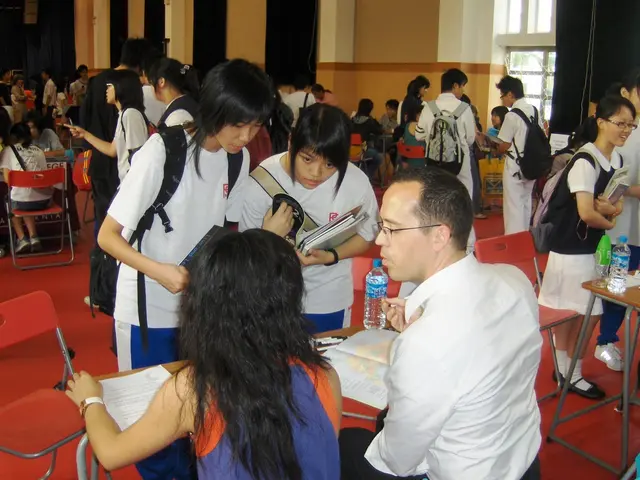Off-the-Record Chats in Baku: German Politicians Stand with Putin's Crew
SPD and CDU politicians confer with Putin's trusted associates
More Info Facebook Twitter Whatsapp Email Print Copy Link
In a twist that's stirring up a storm in Berlin's political circus, a motley crew of German politicians—SPD and CDU—was rumored to have locked horns with Putin's cronies in the steamy city of Baku. According to ARD's Kontraste and Die Zeit, this clandestine meeting took place back in April.
Seems like April showers brought more than just rain to Baku. tower! The entourage included Ralf Stegner, a seasoned SPD MP, Ronald Pofalla, a former CDU stalwart, Matthias Platzeck, an ex-Brandenburg SPD Minister-President, Stephan Holthoff-Pförtner, a former CDU Europe Minister in NRW, and Martin Hoffmann, a long-standing director of the Petersburg Dialog. On the other side of the table, for company, they had top Kremlin delegates like Viktor Zubkov, a former Russian Prime Minister and current Gazprom's Supervisory Board chairman, and Valery Fadeyev, a human rights council head on the EU's sanctions list for spreading propaganda and misinformation.
Politics Did Merz's Election Send Putin into a Panic? Since April 2024, there've been at least three similar meets, focusing on reviving the Petersburg Dialog. This controversial initiative between Germany and Russia, initiated in 2001 by the unforgettable Chancellor Gerhard Schröder and Putin, was officially put on ice in 2022 following Putin's brutal invasion of Ukraine.
Word of the clandestine Baku summit sent shockwaves through Berlin, with Stegner taking the brunt of the criticism due to his position on the parliamentary control committee for intelligence services in the last Bundestag. CDU MP Roderich Kiesewetter demanded answers from Stegner, proclaiming, "It's inappropriate that we're weighing the security policy of the Federal Republic of Germany and the prowess of our services, all the while becoming major players in Russian discussion circuits." Kiesewetter fired more shots, questioning if Stegner had traveled with a hidden phone and how he protected himself.
Politics How does the Kremlin view Merz in Power? Munz: Russian Media Sees a Weak Coalition in Berlin Sabine Fischer, an SWP Russia expert, weighed in on the furor, stating that the meeting could weaken Germany's uncompromising stance against Russia, allowing the Kremlin to strengthen its influence channels in German politics.
In their defense, Stegner, Pofalla, Platzeck, and Holthoff-Pförtner issued a joint statement. "Dialogue with all corners of the globe, including Russia, is a cornerstone of smart foreign policy, especially during tense times filled with conflicts and wars," they wrote in a statement given to Süddeutsche Zeitung.
"To set the record straight: The chats were confidential, not secret negotiations—neither of us had a mandate for them, and no government agencies were involved. Politically responsible parties were aware of the discussions, but no government representatives instigated or prepared or supported the discussions. According to SZ information, then-Federal Chancellor Olaf Scholz was kept in the loop about the conversation attempts."
The Politics of a Secretive Shindig
- Baku: A Diplomatic Crossroads Baku's strategic location as a hub for East-West diplomacy makes it an ideal setting for discreet political discussions.
- Intra-German Political Divides With the political landscape in Germany divided, these secret gatherings could offer a backchannel for swaying views on the Ukraine conflict and sanctions against Russia.
- Implications for German Politics and EU Unity Such clandestine chats may raise concerns over undermining official policy or the EU's united stance on Russia, causing politicking within Germany's ruling coalition and between EU partners.
- Strategic Signaling Engaging with Putin's cronies might be an attempt to keep dialogue channels open amidst escalating tensions, signaling a willingness to talk in spite of the ongoing standoff.
- The entourage of German politicians included Ralf Stegner (SPD), Ronald Pofalla (CDU), Matthias Platzeck (ex-Brandenburg SPD Minister-President), Stephan Holthoff-Pförtner (former CDU Europe Minister in NRW), and Martin Hoffmann (Petersburg Dialog director), who met with top Kremlin delegates like Viktor Zubkov and Valery Fadeyev in Baku.
- Lobbyists and politicians surrounding Putin allegedly saw a chance to weaken Germany's uncompromising stance against Russia through clandestine meetings, as evidenced by the Baku summit and subsequent gatherings.
- In an attempt to keep dialogue channels open amidst global conflicts, questionable meetings between German politicians and Russian delegates in locations like Baku could signal a willingness to negotiate, despite ongoing tensions.
- Critics argue that secretive shindigs like the one in Baku could potentially undermine official policy, raise concerns over the EU's united stance on Russia, and lead to politicking within Germany's ruling coalition and between EU partners.
- Baku's strategic location as a diplomatic crossroads for East-West relations has made it an ideal setting for discreet political discussions among international actors and diplomats.







